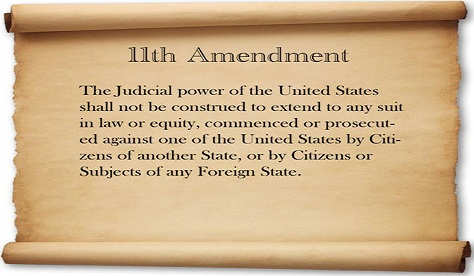Posted On: Wednesday - March 4th 2020 4:52PM MST
In Topics: History Liberty/Libertarianism Morning Constitutional
(For the non-Libertarian readers who couldn't give a damn about "Muh Constitution" or just those bored with this stuff, not to worry - these posts will come only once or twice a week.)

Upon North Carolina's ratification on Feb. 7th 1795 as the 12th of 15 States, Amend XI was made part of the Law of the Land.
It's been a month and a half since our post Peak Constitutional Amendment. We promised to go through the 17 Amendments to the US Constitution since the Bill of Rights, the 10 Amendments of which were signed up to within a couple of years of the same time as the original document.* This 11th Amendment, ratified only 6 years after the original document was implemented, is honestly one that I never have known or thought about before.
This one looks like nothing but a slight administrative matter of jurisdiction of the courts - again, in case the .jpg above is not clear:
The Judicial power of the United States shall not be construed to extend to any suit in law or equity, commenced or prosecuted against one of the United States by Citizens of another State, or by Citizens or Subjects of any Foreign State.I've written before that you don't need to be a SCROTUS member or lawyer of any kind to understand the US Constitution. This one seems clear enough - Federal courts cannot be used for to adjudicate a certain lawsuits against one of the States. It is meant to modify the bolded portion of Article III (on the Judicial branch of government), Section 2 below:
The judicial Power shall extend to all Cases, in Law and Equity, arising under this Constitution, the Laws of the United States, and Treaties made, or which shall be made, under their Authority;--to all Cases affecting Ambassadors, other public Ministers and Consuls;--to all Cases of admiralty and maritime Jurisdiction;-- to Controversies to which the United States shall be a Party;--to Controversies between two or more States;--between a State and Citizens of another State;--between Citizens of different States;--between Citizens of the same State claiming Lands under Grants of different States, and between a State, or the Citizens thereof, and foreign States, Citizens or Subjects.The Federalists, those that (quite rightly, it turns out) feared a big Federal government, were worried about lawsuits filed by individuals against the various States being decided in Federal courts, i.e. by the Federal government.
A website called Constitutioncenter.org has some great background and explanation on this and the entire Constitution. The home page has the usual PC BS on it, but one can see upon clicking to the Constitution itself, that this is a great site for understanding of this supposed Law of the Land. I will likely use this often for the posts to come on these 17 Amendments.
Here is the discussion on Amendment XI from the same site, and, we come to what one might expect - "Anything you Amend with can and will be used against you ...:"
The Supreme Court’s decisions afford states immunities from suit that appear to go beyond the terms of the Eleventh Amendment. For example, as noted, suits by individuals against their own state have been barred; suits by foreign states are also barred. The Court has further held that states enjoy immunity in state court from suits based on federal law. Alden v. Maine (1999). Moreover, states may “consent” to suits that appear to be barred by the Amendment. These decisions suggest that the Court may regard state sovereign immunity—the legal privilege by which the state government cannot be sued, at least in its own courts, without its consent–as an underlying constitutional “postulate,”—an assumption reflected but not fully captured by the words of the Eleventh Amendment.See, now our Founders wanted us as individuals to be able to have grievances redressed, by our State and the Feds via lawsuits if need be. Does that happen much anymore? Most of us feel powerless against the Department of Motor Vehicles, much less against the higher-ups in State government.
While the states continue to enjoy broad sovereign immunity from suit, the Supreme Court does allow suits against state officers in certain circumstances, thus mitigating the effect of sovereign immunity. In particular, the Court does not read the Amendment to bar suits against state officers that seek court orders to prevent future violations of federal law. Moreover, suits by other states, and suits by the United States to enforce federal laws, are also permitted.Oh, I see, so the Feds can sue the States. I may have to run this by Ann Coulter, but something tells me that even just half a decade after the Constitution was ratified, these Amenders, of which there were to be many more to come, were already screwing things up for us.
* There was an understanding that the Constitution would not be ratified by certain states were the Bill of Rights amendments not included.
******************************************
[UPDATED 03/06:] Corrected Bill of Rights timetable. The document was not signed together with the BoR, only approved by certain states with an understanding of the BoR being incorporated (2 more of original 12 of the "Massachusetts Compromise" were not).
******************************************
Comments: